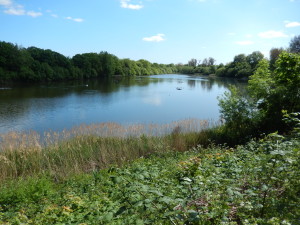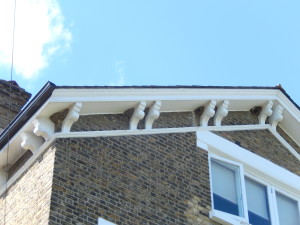
An unexpectedly warm and sunny afternoon in May is an opportunity too good to miss, so I went out with bicycle and binoculars along the river, and spent some time in the Leg of Mutton local nature reserve at Barnes. This is a bit of a secret corner, as it’s not far from the WWT’s London Wetland Centre which is certainly far better known. It’s also quite beautiful in springtime, the paths dressed in Queen Anne’s Lace (cow parsley to you) and the lake resplendently blue with new green borders. From the woods, Blackcaps sang all over; from the reeds, both Reed Warbler and Sedge Warbler sang their cheerful repetitive songs: I had a fine view of a Reed Warbler atop the reeds shown in the photo. A Coot with five cootlings scooted about the end of the lake (to the left); a mother Mallard escorted a neat convoy of ducklings; a few Tufted duck preened; five male Pochard dabbled heads-down; more surprisingly, a pair of Gadwall paddled about on the far side. A Mute Swan sat on a nest amongst the reeds. The flowers were visited by masses of small bees. Apart from the planes overhead, the city felt far away.

On the other side of the river (with the help of the handsome green Barnes Bridge) I had a wonderful surprise: House Martins. Four were wheeling and chattering above Chiswick Mall, right by a house decorated with a dozen House Martin nests (many of them visible in the photo), and several in usable condition. This was news to me because the old colony a few hundred yards away was abandoned for whatever reason some years ago. But it is clear that the birds have nested repeatedly in the past few years, and it certainly looks as if they’ll nest again this year. The only small fly in the ointment can be seen on the extreme left of the photo: there is the remains of at least one nest behind some netting, so the birds must have been considered a nuisance on that side of the house, at least. Let us hope that their presence on the front doesn’t trouble anyone, as the colony may well be the only one in Chiswick, and is certainly one of not very many in West London. Being by the river, there are plenty of flies, and the house’s wide eaves with stout supports are ideal for the species.
